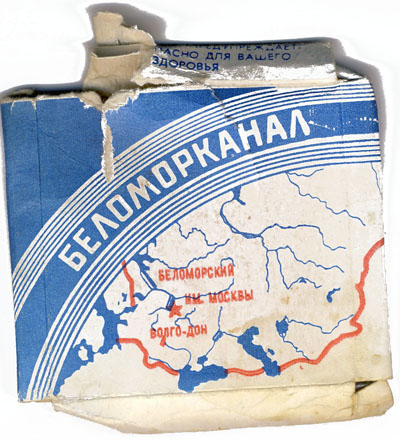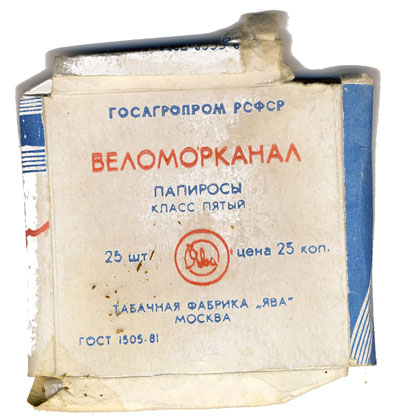While rummaging around in a box in my office sometime ago, I found this old crushed box of Belomorkanal (Беломорканал) cigarettes from my visit to Russia years ago.


The Belomorkanals were "famed" throughout Russia and Eastern Europe for their cheapness and their incredible strength. On closer observation of one of the cigarettes, you can see why. A "cigarette" consisted of a hollow cardboard tube, about 1.5" long, and then the tobacco in a thin paper tube at the other end. There was no filter. Boy, were they bad! They were strong; they smelled bad; they gave you an immediate headache.
Technically, a Belomorkanal was not cigarette--The Russians did/do make regular, filtered cigarettes--but was more commonly called a papirosa (папироса). I am not sure, but I think that the Belomorkanals are still being made.

Imagine my surprise when I even found a Wikipedia article on Belomorkanal (cigarette).
The Belomorkanal cigarettes had been created decades ago to commemorate the construction of the White Sea-Baltic Canal, (Belomorsko-Baltiiskii Kanal imeni Stalina, Беломорско-Балтийский канал имени Сталина) usually abbreviated as "Belomorkanal." The canal that constructed to join the White Sea and the Baltic Sea near St. Petersburg. The canal ran along several rivers and through some lakes for a total length of about 140 miles with the man-made canal part stretching about 40 miles.
The canal was a major construction project of the Soviet Union's First Five-Year-Plan, and famously lauded for its early completion in August 1933. More tragically, the canal was built mostly with forced labor convicts working in brutal conditions. It has been estimated that over one hundred thousand prisoners died building the canal project.